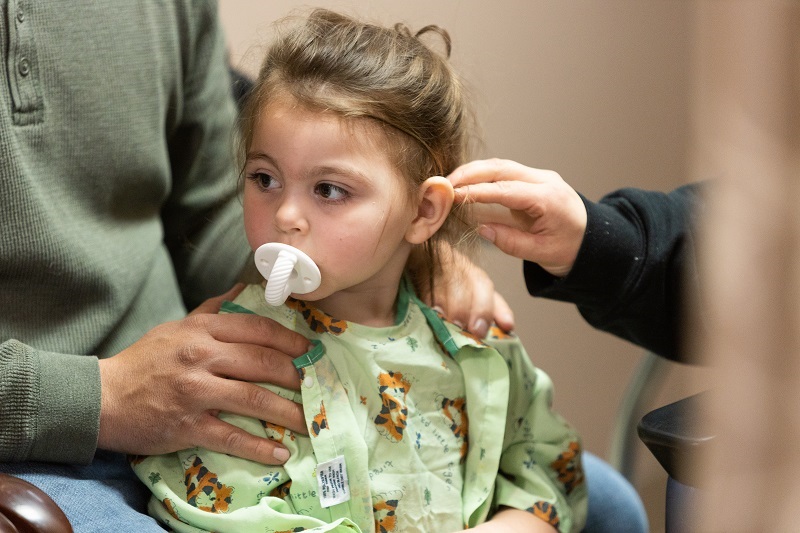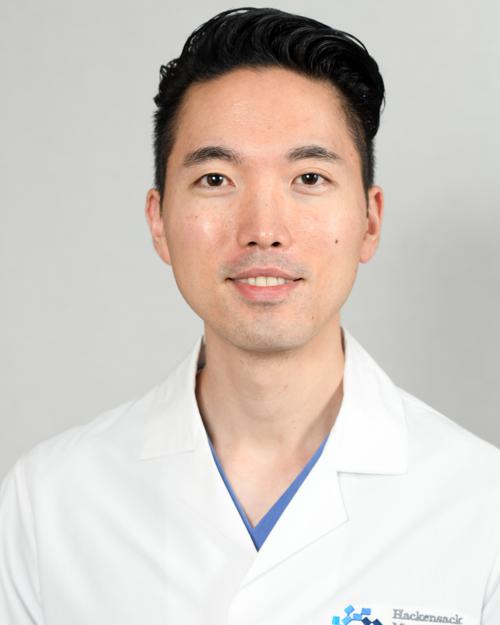3-year-old NJ Girl Hears for First Time After Cochlear Implants

November 16, 2023
Sitting in a room filled with nervous and excited people, 3-year-old Giulia was fully engrossed playing with bubbles. Then something unusual happened. She heard a sound. For a second, Giulia paused in uncertain surprise. The sound continued, and she became frightened because it was the first time she had heard a sound.
Three weeks prior to that day, Giulia had two cochlear implants surgically placed on both sides of her head. Now, while sitting in the doctor’s office with her family, the devices were turned on.


“We start off really low and quiet, but even still, it's something new and she didn’t know what to do with it and it didn’t make any sense to her, so we were kind of expecting that response,” Meghan Lockard, ScD, a clinical audiologist at Joseph M. Sanzari Children’s Hospital explains about Giulia’s reaction.
Like all newborns, after Giulia’s birth, she had her hearing tested. The results were normal. But by the time she was 10 months old, her parents knew something was wrong. She didn’t seem to react to sounds. “The dog would bark, the door would slam, we'd be watching fireworks, and nothing,” Giulia’s father, Nick, remembers.
Giulia’s hearing was tested again, but the test was once again normal. Her parents were perplexed. “Her speech wasn't progressing, or even really starting. There wasn't any ‘mama’ or ‘dadda,’” Giulia’s mother, Danielle, says.


Finding Answers at Long Last
Giulia’s parents became worried and frustrated. Giulia’s pediatrician recommended they take their daughter to an audiologist, who confirmed that Giulia’s hearing was impaired. “The audiologist said, ‘I want you to go see Meghan Lockard at Hackensack Audiology. She’s incredible, and they have way more technology than I have. They'll figure it out,” Danielle remembers.
Meghan tested Giulia with a number of standard tests, including one that measures the echo produced in the cochlea of the ear when it picks up sound. When no echo presented, Meghan scheduled Giulia for an auditory brainstem response test. This painless test measures response from the auditory nerve. Under light sedation, electrodes were placed on Giulia’s head and sounds played into her ears. “We determined at that point that she had no usable hearing,” Meghan says.
Learning this news wasn’t devastating to Giulia’s parents. “We were so relieved,” Nick says. “We knew she wasn’t hearing, and we were just not getting doctors to confirm this for us, so when they finally did, we were like, ‘Absolutely, get her in [for treatment], let's do it.’”
Meghan recommended Giulia see Michael Chee, M.D., a pediatric otolaryngologist, to explore the possibility of cochlear implants. “Cochlear implants would open a whole new avenue for Giulia to communicate, express herself and improve her speech development,” Dr. Chee says.
Before placing the implants, Dr. Chee had Giulia wear hearing aids for a couple of weeks to see if she would benefit. As he expected, she didn’t, so he ordered a CAT scan to make sure the structure of Giulia’s ears would allow for the implants. He also ordered genetic testing to find out if her deafness was caused by a mutation and, if so, if that mutation was one that is receptive to implants.
The genetic tests revealed that she has a mutation. Her parents were stunned because there is no history of deafness in the family, and both their other children hear normally.

A Bright Future Ahead
With the implants in, it’s now a matter of Giulia getting used to them and learning to make sense of sound. She attends a school for deaf and hard-of-hearing children, where she receives speech therapy to help her develop her speech and language skills. She is also learning American Sign Language.
Being able to give their daughter the opportunity to experience sound is exciting, Danielle says. “Giulia has no idea what’s coming,” she says.


Next Steps & Resources:
- Meet our source: Michael Chee, M.D.
- Make an appointment online with a pediatric provider near you, or call 800-822-8906.
- Learn more about our audiology children’s health services.
The material provided through Healthier You is intended to be used as general information only and should not replace the advice of your physician. Always consult your physician for individual care.







